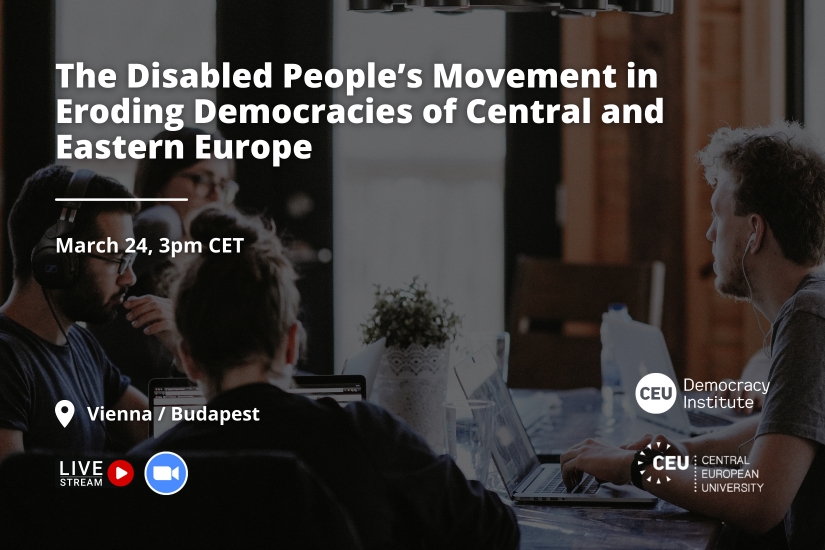
The Office of Inclusion, Diversity and Equality in cooperation with the Inequalities and Democracy Workgroup of the CEU Democracy Institute cordially invites you to its public seminar taking place at two venues (Vienna and Budapest) plus online. The event will present findings of a short cross-country study that explored the position of disability rights movements in eroding democracies of Central and Eastern Europe. The study aimed to understand whether disability movement actors perceive a 'closing space' for their advocacy. Presentations will feature findings of country-studies from Bulgaria, Hungary, Romania, and Serbia.
Please do not hesitate to use the online registration option.
Venues:
- Vienna, Quellenstrasse 51, B319 Senate room
- Budapest Nador 15, Room 104
You can follow the event online.
Program
15.00-15.20
Gabor Petri: Why this study? - Post-socialism, the disability movement, and the closing space - 20 minutes
15.20-16.20
Country reports by co-researchers - 15 min each:
Rados Keravica & Lazar Stefanovic: The Serbian disability movement - Between the hammer (the state) and the anvil (disabled people)
Ina Dimitrova & Mitko Nikolov: 'There is no concept in the disability sphere that has not lost its meaning in Bulgaria': Constructing Potemkin villages in illiberal contexts
Gabriela Tanasan & Leyla Safta-Zecheria: The disability movement in Romania beyond symbolic inclusion in policy making: collaborative approaches and/or constructive criticism
Gabor Petri & Erika Hruskó: 'If the Disability Council would stop working, no one would notice the difference' - The closing space in the Hungarian context
16.20-16.35
Gabor Petri: Main lessons from the cross-national analysis
16.35-17.00 Q&A
Principal Investigator:
Gabor Petri is postdoctoral researcher at the CEU Democracy Institute. He received his PhD at the University of Kent, Tizard Centre in 2019, where his research explored the position of self-advocates in the learning disability and autism advocacy movement. Gabor has over 20 years of experience in the disability field. He has held various positions at disability rights organisations both in Hungary and in the EU. He was director of the Hungarian Autistic Society (2006-2010), where he led the work on the first Hungarian National Autism Strategy. Gabor worked as human rights officer at Mental Health Europe (2011-2014). He was member of the Board of Directors of the European Disability Forum from 2013 to 2022, representing Mental Health Europe. Gabor’s research interests include post-socialist disability policies, the disabled people’s movement, disability human rights, mental health policies, the use of EU Structural Funds, and community-based services.
